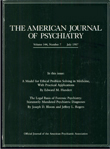Effect of pindolol in hastening response to fluoxetine in the treatment of major depression: a double-blind, placebo-controlled trial
Abstract
OBJECTIVE: In two preliminary studies, pindolol produced robust results in hastening clinical response to antidepressant drugs in depressed patients. Validity of those pilot studies was limited by use of an open- label, unblinded study design, and so the authors conducted a double- blind, placebo-controlled trial to assess the effectiveness of pindolol in hastening response to fluoxetine. METHOD: Drug-free outpatients with major depression were concurrently treated with fluoxetine (20 mg/day) and either placebo or pindolol (5.0 mg b.i.d. or 2.5 mg t.i.d.), for 6 weeks, in a randomized, double-blind manner. After 6 weeks, all patients received fluoxetine and placebo and were followed for 3 further weeks in a single-blind manner. RESULTS: Forty-three patients completed at least 1 week of the protocol. Rates of partial remission after 2 weeks of treatment with fluoxetine and either pindolol or placebo were 17% (four of 23 patients) and 20% (four of 20 patients), respectively. At study completion, 65% of the patients (N = 28) demonstrated at least a partial remission, and there was no difference between treatment groups. The pindolol group, but not the placebo group, demonstrated significant reductions in blood pressure and pulse rate. The average time to remission and the rates of attrition, overall response, and side effects were similar in the two groups. CONCLUSIONS: These findings do not support the efficacy of pindolol in hastening clinical response in patients treated with fluoxetine.



